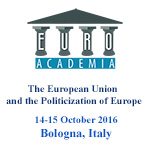Euroacademia Conferences
 Europe Inside-Out: Europe and Europeanness Exposed to Plural Observers (9th Edition) April 24 - 25, 2020
Europe Inside-Out: Europe and Europeanness Exposed to Plural Observers (9th Edition) April 24 - 25, 2020 Identities and Identifications: Politicized Uses of Collective Identities (9th Edition) June 12 - 13, 2020
Identities and Identifications: Politicized Uses of Collective Identities (9th Edition) June 12 - 13, 2020 8th Forum of Critical Studies: Asking Big Questions Again January 24 - 25, 2020
8th Forum of Critical Studies: Asking Big Questions Again January 24 - 25, 2020 Re-Inventing Eastern Europe (7th Edition) December 13 - 14, 2019
Re-Inventing Eastern Europe (7th Edition) December 13 - 14, 2019 The European Union and the Politicization of Europe (8th Edition) October 25 - 26, 2019
The European Union and the Politicization of Europe (8th Edition) October 25 - 26, 2019 Identities and Identifications: Politicized Uses of Collective Identities (8th Edition) June 28 - 29, 2019
Identities and Identifications: Politicized Uses of Collective Identities (8th Edition) June 28 - 29, 2019 The European Union and the Politicization of Europe (7th Edition) January 25 - 26, 2019
The European Union and the Politicization of Europe (7th Edition) January 25 - 26, 2019 7th Forum of Critical Studies: Asking Big Questions Again November 23 - 24, 2018
7th Forum of Critical Studies: Asking Big Questions Again November 23 - 24, 2018 Europe Inside-Out: Europe and Europeanness Exposed to Plural Observers (8th Edition) September 28 - 30, 2018
Europe Inside-Out: Europe and Europeanness Exposed to Plural Observers (8th Edition) September 28 - 30, 2018 Identities and Identifications: Politicized Uses of Collective Identities (7th Edition) June 14 - 15, 2018
Identities and Identifications: Politicized Uses of Collective Identities (7th Edition) June 14 - 15, 2018
What Kind of Role Should the European Union Play for Achieving Sustainable Peace in Georgia? : Improving the Effectiveness of the European Union Monitoring Mission in Georgia (EUMM)
-
-

-
Presentation speakers
- Shu Uchida, Marie Curie Early-Research Fellow, The University of Coimbra, Portugal
- Download presentation
Abstract:
During the Beijing Olympic Games in 2008, a little war shook the world. On August 7, 2008, Georgia tried to forcefully incorporate South Ossetia into the Tbilisi Administrative Territory (TAT), which excludes breakaway regions i.e., Abkhazia and South Ossetia, as Russia was holding its Kavkaz 2008 military drill. Russia intervened in the armed conflict and invaded the TAT. For the first time since 1979, Russia’s military crossed state borders to attack a sovereign state. Based on the six-point agreement brokered by former President of France Nicolas Sarkozy, the armed conflict ceased and the European Union (EU) deployed the EU Monitoring Mission in Georgia (EUMM) as an early warning apparatus to prevent the resurgence of armed conflict. Thus, it focuses on preventing possible future conflict. However, according to the information extracted from the interview with an anonymous EUMM officer in May, 2016, local Georgian people have acknowledged the fact that people cannot cross the Administrative Boundary Lines (ABLs) of breakaway regions and this is no longer a temporary situation. Georgian people do not have access to the ABLs now, and the Russian and South Ossetian side have already stopped putting the new fences for demarcation of the ABLs. This is the new reality. In this respect, the situation on the ground is much more stable than before. Therefore, this research discusses the EU’s role in Georgia, with specific focus on improving the effectiveness of the EUMM. Now that the situation on the ground is relatively “stable”, what kind of role should the EU play in Georgia for achieving sustainable peace? It argues that the EUMM should focus not only on early warning but also other conflict prevention activities e.g., post-conflict stabilization. Moreover, it provides implications that emphasize the importance of conflict transformation for addressing protracted conflicts via the Incident Prevention and Response Mechanism (IPRM), which was established in tandem with the Geneva International Discussions.
-
Related Presentations

Europe and the Last 30 years – Consequences of Abandoning Qualitative Distinctions
- Gerhard Eichweber

The EU’s Changing Discourse in the EU Documents on Civil Society in Turkey
- Alper Yurttas
- Selma Sekercioglu

Diplomatic Instruments: U.S. Symphony Orchestras And The Cold War
- Jonathan Rosenberg













